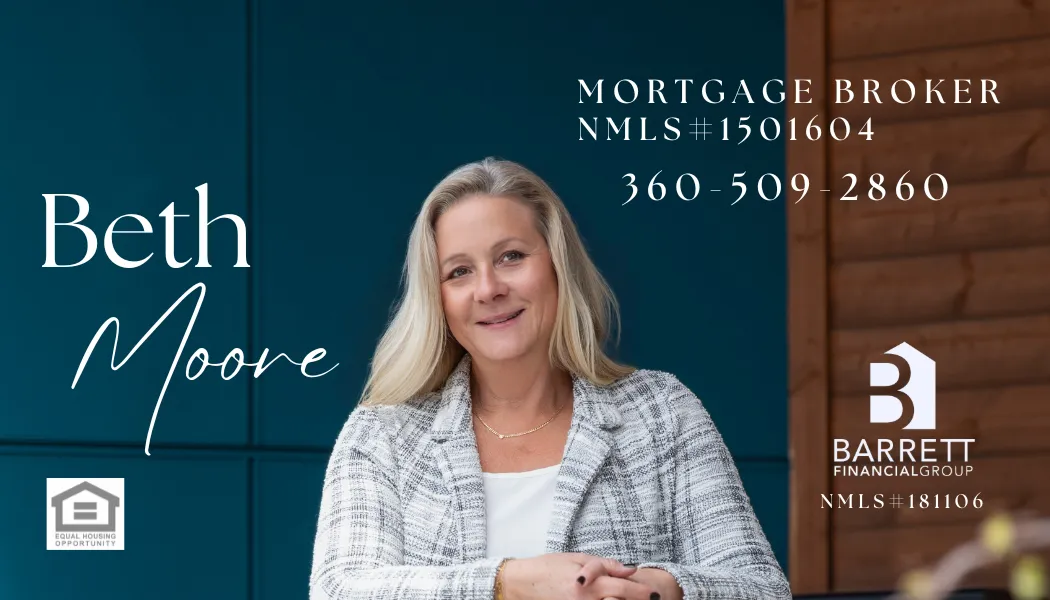
Call: 360-509-2860
Email: [email protected]
Loan
Programs
Loan Programs Options
Explore a variety of mortgage loan options tailored to fit your unique financial needs. Whether you're a first-time homebuyer, looking to refinance, or seeking investment opportunities, we offer flexible solutions to help you achieve your goals. From fixed-rate and adjustable-rate mortgages to government-backed loans and specialized programs, our expert team is here to guide you through each choice, ensuring you find the perfect fit for your budget and lifestyle. Start your journey to homeownership with confidence today!
Conventional

Conventional Loans are a popular type of mortgage that is not insured or guaranteed by the federal government. These loans are typically offered by private lenders and come with various terms and conditions. They are a great option for borrowers with good credit and a stable financial background.
Key Features:
Fixed or Adjustable Rates: Conventional loans can have fixed interest rates, providing consistent monthly payments, or adjustable rates, which may fluctuate over time based on market conditions.
Flexible Loan Amounts: Borrowers can choose from a range of loan amounts to suit their needs, up to conforming loan limits set by the Federal Housing Finance Agency (FHFA).Down Payment Options: While a 20% down payment is traditional to avoid private mortgage insurance (PMI), many lenders offer options with lower down payments, sometimes as low as 3%.
Benefits:
Competitive Interest Rates: Borrowers with strong credit histories may benefit from lower interest rates compared to other loan types.
Variety of Terms: Conventional loans come in various term lengths, typically ranging from 10 to 30 years, allowing borrowers to choose a plan that fits their financial goals. No Upfront Mortgage Insurance: Unlike some government-backed loans, conventional loans do not require upfront mortgage insurance, which can save borrowers money.
Considerations:
Conventional loans may require a higher credit score and debt-to-income ratio compared to government-backed options. Additionally, borrowers should be prepared for potential PMI if their down payment is less than 20%.
Construction/Land

Construction and Land Loans provide financing options for individuals looking to build a new home or purchase land for future development. These loans are tailored to meet the unique needs of borrowers who are investing in new construction projects or acquiring raw land.
Key Features:
Construction Loans: These short-term loans cover the costs of building a new home. Funds are disbursed in stages, known as draws, as construction progresses.
Land Loans: Designed for purchasing land, these loans can finance raw, unimproved land or land with existing utilities. Options include short-term and long-term financing.
Flexible Terms: Borrowers can choose from various loan terms and structures, depending on their project timelines and financial needs.
Benefits:
Tailored Financing: Construction and land loans are specifically designed to meet the needs of builders and landowners, offering customized solutions.
Access to Larger Amounts: These loans can provide significant funding for larger projects, making it easier to bring your vision to life.
Potential for Customization: With construction loans, you have the opportunity to design and build a home that meets your exact specifications.
Considerations:
Construction and land loans may come with stricter eligibility requirements and higher interest rates compared to traditional mortgages. Additionally, careful planning and budgeting are crucial, as lenders typically require a detailed construction plan and timeline.
Manufactured Homes

Manufactured Home Loans are specialized financing options designed for the purchase or refinancing of manufactured homes, which are built in a factory and transported to their permanent location. These loans cater to the unique aspects of manufactured housing, making homeownership accessible and affordable for many.
Key Features:
Variety of Loan Types: Manufactured home loans can be structured as chattel loans (secured by the home only) or as real estate loans (where the home is permanently affixed to land).
Flexible Down Payment Options: Many lenders offer loans with lower down payment requirements, making it easier for buyers to enter the housing market.
Competitive Interest Rates: Depending on creditworthiness and the type of loan, borrowers can benefit from attractive interest rates.
Benefits:
Affordability: Manufactured homes often cost less than traditional site-built homes, allowing for more affordable housing options.
Quick Closing Times: The loan process for manufactured homes can often be faster than that of traditional homes, enabling quicker access to your new home.
Diverse Uses: Funds can be used not only for purchasing manufactured homes but also for refinancing existing loans or making improvements.
Considerations:
While manufactured home loans offer many advantages, it's important to note that not all lenders finance manufactured homes, and the property may need to meet specific criteria to qualify. Additionally, interest rates and terms can vary widely based on the type of loan and the borrower’s financial profile.
Home Equity Loans

A Home Equity Loan allows homeowners to tap into the equity they’ve built in their property, providing a lump sum of cash that can be used for various financial needs. This type of loan is secured by your home, meaning the amount you can borrow is typically based on the difference between your home’s current market value and the outstanding balance of your mortgage.
Key Features:
Fixed Interest Rates: Most home equity loans come with fixed interest rates, allowing for predictable monthly payments.Flexible Uses: Funds can be used for home improvements, debt consolidation, education expenses, or major purchases.
Potential Tax Benefits: Interest paid on a home equity loan may be tax-deductible, depending on your situation.
Benefits:
Access to Cash: Homeowners can access a significant amount of money quickly.
Lower Interest Rates: Compared to credit cards and personal loans, home equity loans often offer lower interest rates due to their secured nature.
Longer Repayment Terms: With extended repayment options, borrowers can manage their payments more comfortably.
Considerations:
While home equity loans can provide financial flexibility, it's important to consider the risks. Borrowing against your home can put your property at risk if you fail to repay the loan. It's crucial to assess your financial situation and ensure that you can manage the additional debt.
Jumbo Loans

Jumbo Loans are a type of mortgage that exceeds the conforming loan limits set by the Federal Housing Finance Agency (FHFA). Designed for high-value properties, these loans provide financing options for borrowers looking to purchase luxury homes or properties in high-cost areas.
Key Features:
Higher Loan Limits: Jumbo loans allow borrowers to secure larger amounts, making them ideal for purchasing expensive real estate.
No Mortgage Insurance: Unlike conventional loans, jumbo loans typically do not require private mortgage insurance (PMI), which can help lower monthly payments.
Flexible Terms: Borrowers can choose from various loan terms and interest rate options, including fixed and adjustable-rate mortgages.
Benefits:
Access to Luxury Properties: Jumbo loans make it possible to finance high-end properties that exceed conventional loan limits.
Potential for Competitive Rates: Depending on creditworthiness, borrowers may qualify for competitive interest rates, even for larger loan amounts.
Customization: Jumbo loans can often be tailored to meet specific financial needs, allowing for unique financing structures.
Considerations:
Jumbo loans usually come with stricter credit requirements and higher down payment expectations compared to conforming loans. Additionally, interest rates may vary significantly based on market conditions and individual financial profiles. It’s important for potential borrowers to assess their financial situation and consult with a lender to understand the options available.
FHA Mortgage Loans

FHA Mortgage Loans are government-backed loans insured by the Federal Housing Administration (FHA). Designed to promote homeownership, these loans are particularly beneficial for first-time homebuyers and those with less-than-perfect credit, offering more accessible financing options.
Key Features:
Lower Down Payment: FHA loans typically require a down payment as low as 3.5%, making them more attainable for buyers with limited savings.
Flexible Credit Requirements: Borrowers with lower credit scores can still qualify for an FHA loan, often starting at a score of 580.Assumable Loans: FHA loans are assumable, meaning that future buyers can take over the mortgage under the original terms, which can be an attractive feature when selling a home.
Benefits:
Affordability: With lower down payments and flexible credit guidelines, FHA loans open the door to homeownership for many individuals and families.
Competitive Interest Rates: FHA loans often come with competitive interest rates, helping to keep monthly payments manageable.
Rehabilitation Loans: FHA offers special programs, such as the 203(k) loan, which allows borrowers to finance both the purchase and renovation of a home.
Considerations:
While FHA loans provide many advantages, they do require mortgage insurance premiums (MIP), which can increase overall loan costs. Additionally, property standards must be met, and the home must be your primary residence. Prospective borrowers should carefully evaluate their financial situation and consult with a lender to determine if an FHA loan is the right choice for them.
VA Mortgage Loans

VA Mortgage Loans are specially designed for eligible veterans, active-duty service members, and certain members of the National Guard and Reserves. Backed by the U.S. Department of Veterans Affairs (VA), these loans provide a range of benefits to support homeownership for those who have served in the military.
Key Features:
No Down Payment Required: VA loans typically allow qualified borrowers to purchase a home without any down payment, making homeownership more accessible.
Competitive Interest Rates: Because they are backed by the government, VA loans often offer lower interest rates compared to conventional loans.
No Private Mortgage Insurance (PMI): Unlike many conventional loans, VA loans do not require PMI, which can lead to significant savings over time.
Benefits:
Flexible Credit Requirements: VA loans often have more lenient credit requirements, making them an excellent option for borrowers with less-than-perfect credit.
Funding Fee Options: Although VA loans may have a funding fee, this fee can often be rolled into the loan amount, minimizing upfront costs.
Assumability: VA loans are assumable, allowing future buyers to take over the mortgage under the same terms, which can be a valuable selling point.
Considerations:
While VA loans offer many advantages, eligibility is limited to those with military service and certain surviving spouses. Additionally, borrowers should be aware of the funding fee, which varies based on factors such as service type and down payment. It’s essential to consult with a knowledgeable lender to understand the specific requirements and benefits of VA loans.
Refinance Mortgage Loan

Refinance Mortgage Loans offer homeowners the opportunity to replace their existing mortgage with a new loan, often with better terms or lower interest rates. This financial strategy can help reduce monthly payments, shorten loan terms, or access equity built up in the home.
Key Features:
Lower Interest Rates: One of the primary reasons homeowners refinance is to take advantage of lower interest rates, which can lead to significant savings over the life of the loan.
Cash-Out Options: A cash-out refinance allows you to access your home’s equity as cash, providing funds for renovations, debt consolidation, or other financial needs.
Flexible Loan Terms: Borrowers can choose to extend or shorten the loan term, depending on their financial goals and circumstances.
Benefits:
Cost Savings: Lower monthly payments can free up cash for other expenses or investments.
Debt Consolidation: Using equity from your home to pay off high-interest debts can improve your overall financial situation.
Improved Loan Terms: Refinancing may allow you to switch from an adjustable-rate mortgage (ARM) to a fixed-rate mortgage, providing stability and predictability in your payments.
Considerations:
While refinancing can offer many advantages, it’s essential to consider closing costs and fees, which can offset potential savings. Additionally, refinancing may extend the length of your loan, impacting long-term financial goals. A careful assessment of your financial situation and future plans is crucial before proceeding.
Investors Options

Investor Options encompass a range of financing solutions designed for individuals or entities looking to invest in real estate. Whether you’re purchasing rental properties, flipping homes, or developing commercial projects, these options provide the necessary capital to achieve your investment goals.
Key Features:
Variety of Loan Types: Investors can choose from several financing options, including traditional mortgages, hard money loans, and commercial loans, each catering to different investment strategies.
Flexible Terms: Many investor loans offer varying terms, allowing you to select options that align with your investment timeline and cash flow needs.
Leverage Opportunities: Investor loans enable you to leverage your capital, allowing for greater investment potential and the ability to acquire multiple properties.
Benefits:
Access to Capital: Investor options provide the financial resources needed to seize investment opportunities and grow your portfolio.
Higher Loan Limits: Many investor loans offer higher borrowing limits, facilitating larger purchases or projects.
Potential for Passive Income: By investing in rental properties, you can generate a steady stream of passive income, enhancing your financial stability.
Considerations:
Investing in real estate can involve risks, and it’s essential to conduct thorough market research and due diligence. Lenders may have stricter qualification criteria for investor loans, including creditworthiness and experience in real estate investment.

Beth Moore, Mortgage Broker
NMLS# 1501604
© Copyright 2022. Beth Moore. All rights reserved.